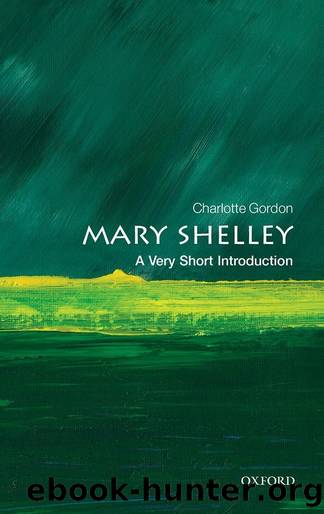Mary Shelley by Charlotte Gordon

Author:Charlotte Gordon [Gordon, Charlotte]
Language: eng
Format: epub
ISBN: 9780192640178
Publisher: OUP Oxford
Published: 2022-01-27T00:00:00+00:00
Chapter 5
Valperga, The Last Man, The Fortunes of Perkin Warbeck, and the new Frankenstein (1821â1831)
Mary Shelleyâs middle novels, Valperga, The Last Man, and The Fortunes of Perkin Warbeck, are the first that she published under her own name. Although earlier female authors, such as Clara Reeve, Susannah Dobson, Ann Radcliffe, and Elizabeth Rowe, had attained acclaim for their work, ranging from translations and scholarly work to Gothic novels and historical fiction, it was still difficult for a woman author to make her way in what was essentially a manâs world. The publication of work under her own name was always a significant step for any woman author, one that Jane Austen, for example, never took, and this made Mary Shelleyâs acknowledgement of her role as author particularly courageous as Valperga, The Last Man, and The Fortunes of Perkin Warbeck are more explicitly political than her earlier works (with the exception of Six Weeks). Developing some of the themes that she first articulated in Six Weeks, she depicts the evils of war and tyranny in all three novels, at the same time that she emphasizes the stumbling blocks that impede social and political reform. However, the dislocations in time and place in all three works allowed Mary Shelley to veil her critiques. Both Valperga and Perkin Warbeck are set in the past, enabling her to make her political points indirectly; she could describe the suffering caused by historical tyrants and long-ago wars, rather than detailing the problems caused by present-day rulers or contemporary conflicts. The Last Man also offers trenchant criticisms of 19th-century politics and social systems, but as a dystopian vision of a catastrophic future. For todayâs reader, Mary Shelleyâs political leanings are easily discernible. In the historical novels, the central female characters, Euthanasia and Catherine, articulate the Wollstonecraftian principles of freedom and community. Although they fail to achieve their goals, their advocacy is clearly meant to be admirable. In The Last Man, the protagonist Lionel supports and extends these ideas. One of the few male characters in Mary Shelleyâs fiction who is capable of growth and change, Lionel endures tremendous suffering, which gives him the wisdom he was lacking in his youth. Despite the overt political and ideological themes in all three of these books, most contemporary readers did not comment on them. Women writers were not, by convention, supposed to venture into the realm of politics, and so Mary Shelleyâs work was regularly misunderstood by reviewers. Critics characterized the historical novels Valperga and Warbeck as âromancesâ and her apocalyptic vision of the future in The Last Man as âdiseasedâ and âpervertedâ, entirely overlooking her commitment to the radical themes of her mother.
Download
This site does not store any files on its server. We only index and link to content provided by other sites. Please contact the content providers to delete copyright contents if any and email us, we'll remove relevant links or contents immediately.
| Books & Reading | Comparative Literature |
| Criticism & Theory | Genres & Styles |
| Movements & Periods | Reference |
| Regional & Cultural | Women Authors |
4 3 2 1: A Novel by Paul Auster(12356)
The handmaid's tale by Margaret Atwood(7732)
Giovanni's Room by James Baldwin(7303)
Asking the Right Questions: A Guide to Critical Thinking by M. Neil Browne & Stuart M. Keeley(5742)
Big Magic: Creative Living Beyond Fear by Elizabeth Gilbert(5728)
Ego Is the Enemy by Ryan Holiday(5395)
The Body: A Guide for Occupants by Bill Bryson(5066)
On Writing A Memoir of the Craft by Stephen King(4921)
Ken Follett - World without end by Ken Follett(4708)
Adulting by Kelly Williams Brown(4554)
Bluets by Maggie Nelson(4535)
Eat That Frog! by Brian Tracy(4502)
Guilty Pleasures by Laurell K Hamilton(4428)
The Poetry of Pablo Neruda by Pablo Neruda(4082)
Alive: The Story of the Andes Survivors by Piers Paul Read(4011)
White Noise - A Novel by Don DeLillo(3992)
Fingerprints of the Gods by Graham Hancock(3980)
The Book of Joy by Dalai Lama(3962)
The Bookshop by Penelope Fitzgerald(3829)
